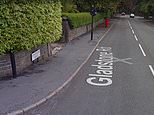Residents’ power saves Sheffield street names with links to the Empire
The defiant city that won’t go woke: People power saves Sheffield street names with links to the Empire
Sheffield street names that came under fire from woke campaigners will be keptCanning Street is after George Canning, who campaigned against freeing slaves Gladstone Road named after William Gladstone, whose father was a slave ownerResidents were asked for their views and said they did not want to see changes
<!–
<!–
<!–<!–
<!–
(function (src, d, tag){
var s = d.createElement(tag), prev = d.getElementsByTagName(tag)[0];
s.src = src;
prev.parentNode.insertBefore(s, prev);
}(“https://www.dailymail.co.uk/static/gunther/1.17.0/async_bundle–.js”, document, “script”));
<!–
DM.loadCSS(“https://www.dailymail.co.uk/static/gunther/gunther-2159/video_bundle–.css”);
<!–
Street names which have fallen foul of woke campaigners will be kept because residents do not want them changed.
It comes after experts claimed Sheffield had a series of streets associated with people ‘involved in slavery’ and ‘violent suppression’.
Canning Street was named after George Canning, the former prime minister who campaigned against freeing slaves.
Street names which came under fire by woke campaigners will be kept because residents do not want them changed. Gladstone Road (pictured) was named after ex-PM William Gladstone
Gladstone Road was named after ex-PM William Gladstone.
He called slavery – which was outlawed in 1834 – the ‘foulest crime’ in UK history, but in his younger days he supported compensation for slave owners.
His father had been one of the British Empire’s biggest slave owners.
Peel Street was established in memory of another ex-PM Sir Robert Peel, founder of the modern-day police, but his father supported slavery, fearing its abolition would harm the cotton trade.
Other city streets include Cannon Hall Road, which was named after a stately home whose owner’s brother was involved in slavery.
He used the mansion’s name on a slave ship, but the house was later owned by an anti-slavery campaigner.
William Gladstone (pictured) called slavery – which was outlawed in 1834 – the ‘foulest crime’ in UK history, but in his younger days he supported compensation for slave owners
A report presented to the Race Equality Commission in Sheffield this year claimed there were aspects of the city’s geography that ‘perpetuate racist, outdated and uncomfortable messages’.
The report found 100 monuments were all dedicated to white people. And the few depictions of non-whites in the city ‘are likely to be considered stereotypical and negative’, such as a carved head with a turban.
Just one plaque issued under the Sheffield Legends scheme honouring celebrities was dedicated to someone with an ethnically diverse background – Olympian Dame Jessica Ennis-Hill.
Residents were asked for their views in a consultation but said they did not want to see changes.
A city council spokesman said: ‘We acknowledge this strong feeling and are not currently intending to change any of the existing street names or remove any statues.’
![]()


